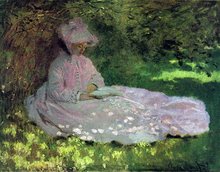While I loved immersing myself in the historical customs, I didn't enjoy the relationship between Lily and Snowflower. I was really unsympathetic to Lily. I know that she didn't know how to respond to Snowflower's sad situations but she didn't have to stick to the obedience schtick. I have to say that I did cry at certain points throughout the book--Beautiful Moon's death, when Snowflower's second son died, the mistreatment of Snowflower by her husband--but I did not cry when Lily mis-read the nu shu letter from Snowflower. I couldn't cough up that much sympathy for Lily. Also, did anyone else notice that none of the men have name's except for Lily's husband? None of the boy children are named. They just call them eldest son, second son, etc. Strange. And while Lily did try to make things right at the end for Snowflower's children, I thought it was too little too late. But then again, how much could Lily have done for Snowflower while she was still alive and married? A woman alone was worse than an animal for at least an animal had worth. And to think there are still cultures that have that kind of thinking about women's worth. I am thankful that we as American women have all the choices we do, especially as a single woman :)
Also, reading about the 8 characters and the 12 signs of the horoscope and how much their lives depended on this information was fascinating to me:
"Naturally, I'd like to say that Snow Flower and I followed our horse natures exactly as the horoscopes outline, but horses--and people--are not always obedient. We say one thing and do another. We feel one way; then our hearts open in another direction. We see one thing but don't understand that blinders hinder our vision." I thought this quote really humanizes Lily but she thought this on the day before her wedding, before she knew the truth of Snow Flower's life. Regardless of how she tried to "see something bigger" than her "tiny slice of life I could see from our lattice window," she couldn't see the sorrow happening so close to her. Also, can you imagine following your horoscope and astrological signs so much so that your life decisions and personality are completely based on them? While I enjoy checking out my horoscope and reading my fortune from a chinese cookie (and adding bed at the end of the fortune), I don't actually believe that "this is a lucky day. You receive good news about money and if you decide to do any traveling this weekend--you have picked the right time for traveling." My actual fortune for today! It's a good thing I am actually traveling this weekend. Hmmm....maybe there is something to this horoscope thing ;)

4 comments:
I also found it interesting about the male characters not being named (I didn't notice that Lily's husband was the only one, though). There was Elder Brother, Younger Brother, etc. Were women not allowed to know and or use the names of the men, I wonder?
I think they all had names, they just used the birth order to rank them, I think, so we wouldn't be confused on who the author was talking about.
I, too, thought the horoscopes were interesting. That they based their assumptions about people (their mothers and mother in laws) on the year they were born. SO interesting.
I haven't read the book yet but it seems that the male characters not being named objectifies them in similar ways that the women were objectified. They were known by their birth order and were valued according to their birth order.
Thanks for pointing out that the names of the male characters weren't given, only their birth order. That really fits Confucianism. Everything was meant to contribute to an ORDERLY society. Individuals were not important; the good of the whole was. Everyone was supposed to know his/her place and function appropriately in that place. This is SO different from our western concept of individual identity and individual rights!!
Post a Comment